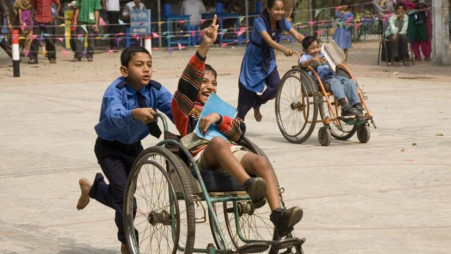When social attitudes towards disabled people make their lives worse
The inadequacy of support for persons with disabilities is not unexpected in Bangladesh given that it is a developing country. But the embedded societal attitudes and behaviours towards individuals with disabilities exacerbate their situation

It is often difficult for children with disabilities to attend schools, even though their right to education is protected by law.
Parents of children with disabilities often worry about the way their children are treated at schools by teachers, peers and other staff. They worry that people at schools will not be able to cater to the additional needs of children with disabilities.
While it is impractical for the parents to stay at school, sacrificing their career, they also fear that their children could face different forms of humiliation or hurt by other children. Even in their presence, their children are humiliated, and it is likely to intensify in their absence.
These observations came through during the fieldwork of an ongoing study by the BRAC Institute of Governance and Development (BIGD) in collaboration with researchers from Cambridge University. During the process of information gathering, a mother talked about how she had always wanted to secure a stable future for her daughter, who has speech and learning-related disabilities, by ensuring her education. However, she and her husband had lost all hope after repeated incidents of insult and unjustified criticism from their community.
According to the National Survey on Persons with Disability 2021, 2.80% of Bangladesh's population – 3.29% of males and 2.34% of females – are persons with disabilities. To protect their rights, the government of Bangladesh has taken initiatives such as monetary allowance, free health services and assistive devices, non-discriminatory education policy, reasonable accommodation at the workplace, and quota in government jobs, as outlined in the Persons with Disabilities Rights and Protection Act-2013.
Despite the measures, persons with disabilities and their families experience untold suffering due to the realities on the ground. Given that Bangladesh is a developing country, the inadequacy of support for persons with disabilities is expected. But the embedded societal attitudes and behaviours towards individuals with disabilities exacerbate their situation.

During the study, children with disabilities and their parents both revealed that their relatives and neighbours sometimes do not allow their children to play with a child with disabilities. Even extended family members tend to avoid or pass humiliating comments toward persons with disabilities.
The neighbours also join in and claim that the disability of a child is the result of their parent's misconduct. Also, they often face uncomfortable questions at social events and gatherings. These attitudes and behaviours further restrict the mobility and inclusion of persons with disabilities and their families, virtually making them socially ostracised and diminishing their potential.
The bullying, disparaging remarks and sense of insecurity regarding the child sometimes translate into the parents feeling burdened by the presence of their children with disabilities. Additionally, they often start believing that the disability has been caused by some superstitious reasons or specific sins of the parents. Sometimes, they resort to hiding their children with disabilities from society.
All these adverse social treatments hinder children and persons with disabilities from having a fulfilling life. While parents try to manage these situations, it becomes difficult to remain hopeful about their children's future. Consequently, they become less and less enthusiastic over time about making their children self-reliant. In general, although parents wish to see their children with disabilities manage their living by becoming self-reliant like others, they end up doing little to nothing in reality.
The dwindling efforts toward their children have manifold effects. With parents focusing more on combating social criticism, they fail to gather knowledge on how to improve the lives of their children with disabilities. Often, they remain ignorant about government facilities, allowances and the constitutional rights of their children.
Often parents do not avail of these supports even when they know about them. Acquiring any of the benefits would mean admitting that they have at least one person with a disability in the household – a fact they would rather sweep under the carpet, fearing social stigma. The social pressure ultimately impacts the entire family, both mentally and financially. As a result, poor families become financially more vulnerable to managing the expenses associated with a child with a disability. In addition, a family with a child with disabilities often becomes traumatised as it confronts multi-layered hatred from within and beyond the extended family.
Instead of coming to their aid, society creates obstacles for families with children with disabilities in their path at every turn. Changing attitudes is challenging. However, cooperation and understanding at the societal level can break the fettered cycle of prejudice towards disability and end this inhumanity. On this day, for persons with physical disabilities, we should reflect on the human resources we are losing out to the social stigma we have nurtured in our society.
Md Karimul Islam, Nabila Tahsin and Dipika Biswas are Research Associates at the Brac Institute of Governance and Development (BIGD), Brac University



 Keep updated, follow The Business Standard's Google news channel
Keep updated, follow The Business Standard's Google news channel















